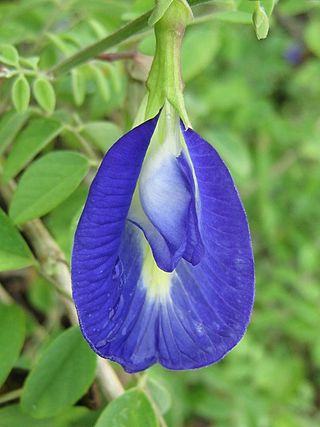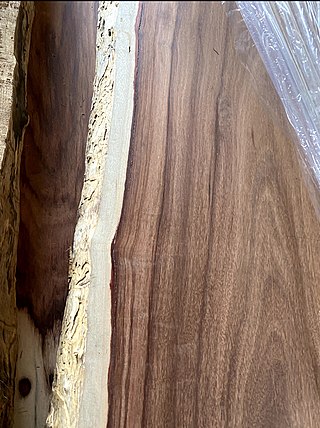
Abarema is a neotropical genus in the family Fabaceae. It is native to Brazil, Cuba, and Venezuela. Most of the species can be found in the Amazon Basin and the Guyana Highlands. They have a deep-green fernlike foliage, with bipinnately compound leaves.

Manilkara is a genus of trees in the family Sapotaceae. They are widespread in tropical and semitropical locations, in Africa, Madagascar, Asia, Australia, and Latin America, as well as various islands in the Pacific and in the Caribbean. A close relative is the genus Pouteria.

Theobroma is a genus of flowering plants in the mallow family, Malvaceae, that is sometimes classified as a member of Sterculiaceae. It contains roughly 20 species of small understory trees native to the tropical forests of Central and South America.

Clitoria is a genus of mainly tropical and subtropical, insect-pollinated flowering pea vines.

Peltogyne, commonly known as purpleheart, violet wood, amaranth and other local names is a genus of 23 species of flowering plants in the family Fabaceae; native to tropical rainforests of Central and South America; from Guerrero, Mexico, through Central America, and as far as south-eastern Brazil.

Henri Pittier National Park is the oldest national park in Venezuela, originally created in 1937 under the name of Rancho Grande by decree of President Eleazar López Contreras. In 1953 the park was renamed in honor of Henri Pittier, a distinguished Swiss geographer, botanist and ethnologist, who arrived in Venezuela in 1917, classified more than 30,000 plants in the country and devoted many years studying the flora and fauna in the park.

Henri François Pittier de Fabrega was a Swiss-born geographer and botanist who started Venezuelan National Park history.
Alexa is a genus of flowering plants. It includes ten species which are native to Venezuela, Guyana, Suriname, French Guiana, and northern Brazil in northern South America. Members of this genus accumulate iminosugars in their leaves.

Muellera is a genus of flowering plants in the family Fabaceae. It includes 32 species native to the tropical Americas, ranging from southern Mexico to northern Argentina. It belongs to the subfamily Faboideae.
Ronnbergia tonduzii is a species of flowering plant in the family Bromeliaceae, native to Colombia, Costa Rica, Ecuador and Panama. It was first described in 1903 as Aechmea tonduzii.

Théophile Alexis Durand was a Belgian botanist.
Clavija is a genus of flowering plants belonging to the family Primulaceae.
Decazyx is a genus of flowering plants belonging to the family Rutaceae.

Diclidanthera is a genus of flowering plants belonging to the family Polygalaceae.

Zanthoxyloideae is a subfamily of the family Rutaceae.
Raputiarana is a genus of flowering plants belonging to the family Rutaceae.
Tibouchina catharinae is a species of flowering plant in the family Melastomataceae, native to Venezuela. It was first described by Henri François Pittier in 1947.
Tibouchina striphnocalyx is a species of flowering plant in the family Melastomataceae, native to north Brazil, Colombia and Venezuela. It was first described in 1828 by Augustin de Candolle as Osbeckia striphnocalyx.

Dalbergia granadillo, the granadillo or zangalicua, is a species of flowering plant in the family Fabaceae, native to central and southern Mexico, and El Salvador. A slow-growing tree reaching 20 m (66 ft), it is listed as Critically Endangered due to illegal logging of mature individuals.











